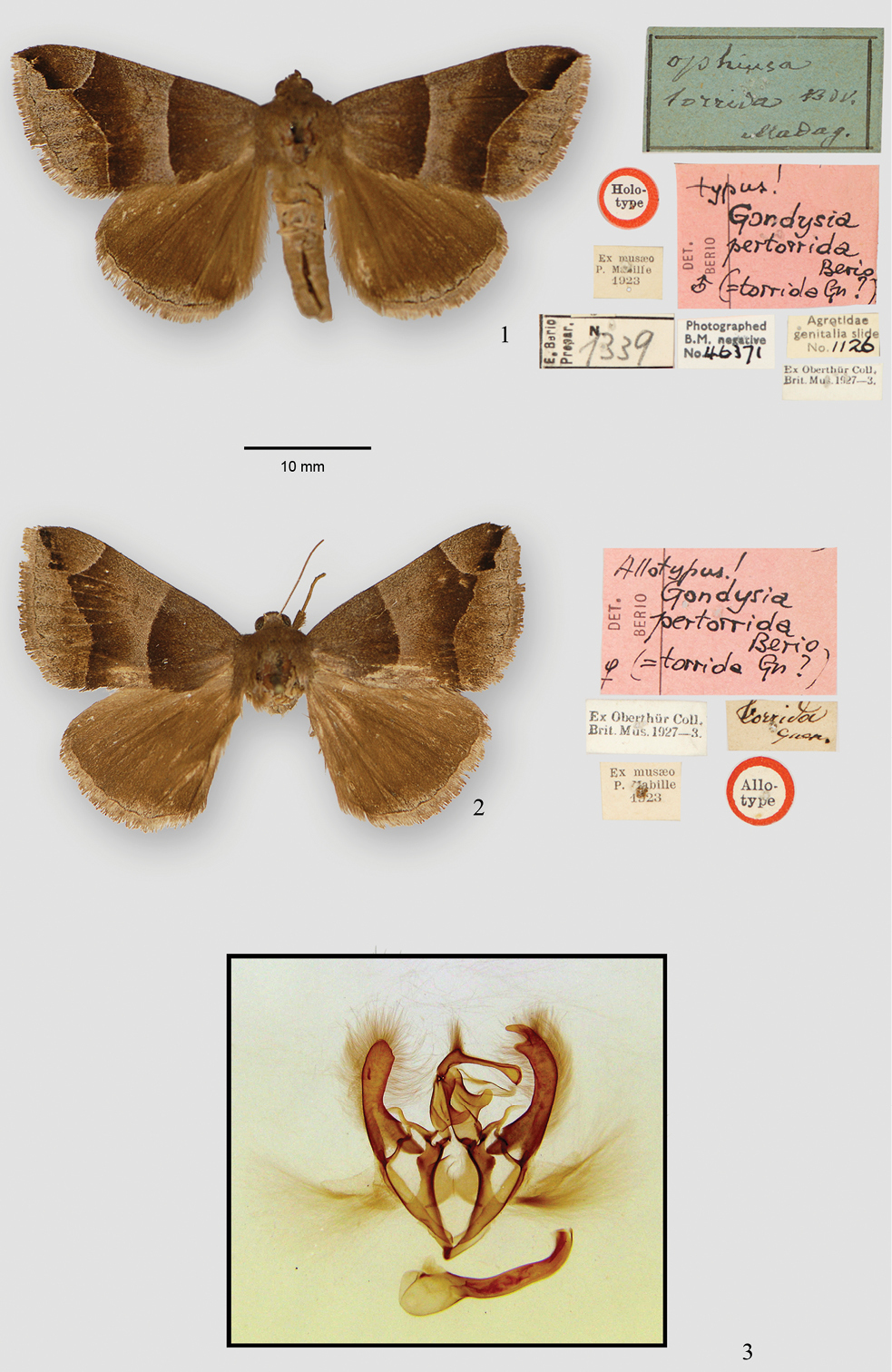






(C) 2011 J. Bolling Sullivan. This is an open access article distributed under the terms of the Creative Commons Attribution License, which permits unrestricted use, distribution, and reproduction in any medium, provided the original author and source are credited.
For reference, use of the paginated PDF or printed version of this article is recommended.
The recently proposed genus Neadysgonia Sullivan, 2010, was preceded in the literature by Gondysia Berio, 1955, a monotypic genus based on specimens without locality labels but presumed to be from Madagascar. The genus Gondysia replaces Neadysgonia and the species Gondysia pertorrida Berio, 1955, becomes a junior synonym of Gondysia consobrina (Guenée, 1852).
Taxonomy, Dysgonia, Gondysia, Neadysgonia, Madagascar, United States
Recently, the genus Neadysgonia Sullivan was proposed for the North American species formerly placed in Dysgonia Hübner (
During a visit to the British Museum in September of 2010 the type specimens of Gondysia pertorrida, their attached labels, and dissected genitalia, were photographed using a Cannon G10 camera and light box.
Repository abbreviationsBMNH Natural History Museum [statutorially: British Museum (Natural History)], London, UK
DiscussionDuring a visit to the BMNH we were able to examine the type specimens on which the name Gondysia pertorrida Berio is based. Adults were photographed as well as a slide preparation of the male genitalia of the type. The male and female of Gondysia pertorrida, with their labels, and the genitalia of the male holotype, are shown in Figure 1. British Museum records indicate that these specimens were obtained from M. P. Mabille who had a large amount of material from Madagascar and described many species from the island (bibliography in
Figures 6, 12 in
Ophiusa consobrina Guenée was described from an unknown number of specimens from an unknown locality. No type material was found in the BMNH collections or those of the Paris Museum (
Gondysia pertorrida, syn. n., is conspecific with Neadysgonia consobrina and thus is a junior synonym. However, the generic name Gondysia Berio is available and replaces Neadysgonia Sullivan, which is 55 years its’ junior. Therefore, the North American species are as follows:
Gondysia Berio, 1955
Parallelia, Auct. nec Hübner, 1818
Neadysgonia Sullivan, 2010, syn. n.
Neadysgonia consobrina (Guenée, 1852), syn. n.
Neadysgonia redditura (Walker, 1858)
Neadysgonia pertorrida Berio, 1955, syn. n.
Neadysgonia similis (Guenée, 1852), syn. n.
Neadysgonia apicalis (Guenée, 1852)
Neadysgonia concolor (Grote, 1893)
Neadysgonia smithii (Guenée, 1852), syn. n.
Neadysgonia telma (Sullivan, 2010), syn. n.
Recent collecting and genitalic examination have extended the known range of Gondysia smithii to northern Florida, Gondysia telma to central Florida (Terhune Dickel pers. comm.), and of Gondysia smithii to Virginia (Steve Roble, pers. comm.).
Male and female types of Gondysia pertorrida Berio and their affixed labels. Genitalia (BMNH slide: Agrotis 1126; E. Berio 1339) of male holotype of Gondysia pertorrida Berio.
We would like to thank Jocelyn Gill and Don Lafontaine for help in preparing the figure and suggestions regarding the manuscript. Martin Honey graciously allowed us access to the collections under his care at the British Museum. Steve Roble and Terhune Dickel kindly provided additional data on the distribution of Gondysia based on their genitalic dissections.
